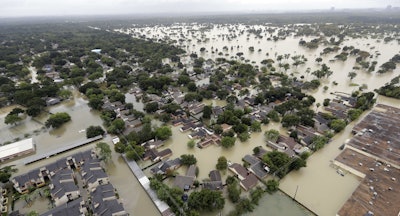
Federal health authorities warn that as the Houston area continues to deal with unprecedented flooding from Hurricane Harvey, household chemicals are among the top risks to those affected by the storm.
Although drowning remains the most immediate threat from days of intense rainfall, officials from the Centers for Disease Control and Prevention warned that people in contact with flood waters should take precautions due to the likelihood that they could contain toxic substances.
Although Texas' Gulf Coast is home to a massive collection of petrochemical facilities — ExxonMobil and Shell were among the companies conceding that storm damage caused leaks at their refineries — CDC officials said that products stored in homeowners' flooded garages or sheds are more likely to result in contaminated water.
The agency said that people exposed to flooding should promptly shower and wash their hands; simply wading in contaminated water could result in skin rashes.
The Washington Post on Tuesday cited reports on social media of an "unbearable" smell in parts of Houston, although it was not clear what caused the odor.
“The no. 1 thing we’re concerned with in a flood is chemicals,” CDC associate director for emergency management Renee Funk told Reuters.
Another concern, according to a Bloomberg report, is the fate of the region's water treatment facilities.
Drinking water treatment plants tend to be built on higher ground and are at less risk of rising water, but the storm could affect their power supply — and their ability to treat drinking water — particularly in smaller, rural communities.
Wastewater facilities, by contrast, are generally located in low-lying areas, and the deluge of recent days means that raw sewage will likely be allowed to bypass those plants and enter southeast Texas waterways.
The Environmental Protection Agency is developing a plan to test flood waters for contamination, officials told Bloomberg.






















